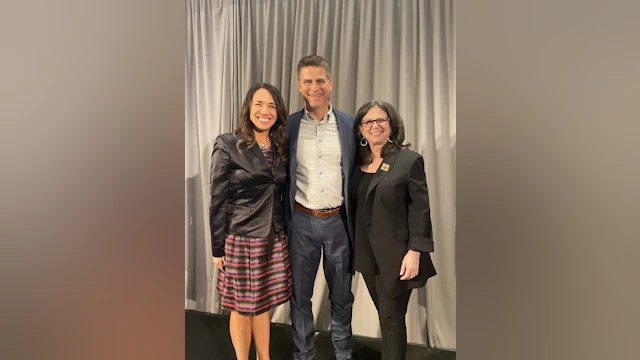The American Foundation for Suicide Prevention recently honored its 2024 Research Award recipients at its annual Research Award Dinner on May 22 at the Conrad Hotel in New York City. Here, AFSP’s Vice President of Research, Dr. Jill Harkavy-Friedman, reflects on this special night.
AFSP’s Research Award Dinner was anything but the cold and sterile laboratory with people in white coats that people often conjure up when thinking of research. The evening was a warm and friendly gathering of AFSP Board and Scientific Council members, researchers in the New York area, and friends and family of the awardees: Allison Athey, Barbara Stanley, Cathy Barber and Jeffrey Bridge.
We started by presenting Allison Athey, PhD, from Rand and Johns Hopkins University, with the Paula J. Clayton Early Career Research Grant Award for her grant entitled, “A Pilot Study of Psychological First Aid for Suicide Loss Survivors in Medical Examiner/Coroners’ Offices.” The awardee was selected by a committee from AFSP’s Scientific Council from a pool of AFSP Early Career and Postdoctoral AFSP grantees, who themselves were selected in the 2022 grant cycle. The grant reflects Dr. Clayton’s primary interests: mood disorders and related somatic and pharmacological treatment, bereavement by suicide, and suicide prevention in the medical education community. Dr. Athey received a plaque, $1000, and attended our annual Lifesavers Gala the following evening. A great way to see the opportunities that lie ahead in suicide research.
Dr. Barbara Stanley, professor at Columbia University, received our Lifetime Achievement Research Award for her significant contributions to suicide prevention throughout her career. Sadly, the award was presented posthumously as she passed away in 2023. She is most known for developing the Safety Planning Intervention, along with Greg Brown, though her contributions to suicide prevention spanned more than 40 years and included working to understand and help people with borderline personality disorder and suicide risk. Her compassion and clinical acumen, along with her wonderful mentorship of early career researchers, were noted in a short film developed by her peers. Dr. Stanley was involved with AFSP nearly from the start. In addition to having received several AFSP research grants, she was a member of AFSP’s Scientific Advisory, Research Grants Committee and Scientific Council. As her daughter shared, “She loved AFSP.” And we love her.
Catherine (Cathy) Barber, MPA, senior researcher at Harvard University, was honored with a Lifetime Achievement Award in Public Health and Community Impact for Suicide Prevention. Cathy was the first to recommend to us how to work with the firearm owning community and helped AFSP develop our approach to preventing suicide in this population. She has served on our Public Policy Committee for many years and impacted communities across the country. Her colleague, David Hemenway, PhD, a professor at Harvard, presented a heartfelt and insightful discussion of Cathy’s illustrious career and accomplishments, which include helping to initiate and develop the National Violent Death Reporting System, which is the only comprehensive national data base for people who have died by suicide, along with her work noted above. We have been honored to call her a friend and champion for AFSP.
The evening ended with a moving presentation by our Annual Research Award recipient, Jeffrey Bridge, PhD, professor of pediatrics at The Ohio State University and Nationwide Children’s Medical Center. He was honored for his work related to suicide among youth. He has been connected with AFSP since he was granted an Early Career Research Award in 2006 for assessing cognitive functioning, the way kids think, and suicide. He received another grant along with Katilin Szanto, MD and John Keilp, PhD to study the relationship between cognition and suicide across the lifespan, from youth through seniors. He is an AFSP Scientific Advisor and a member of both the Research Grants Committee and our Scientific Council. During his remarks, through which he shared the path he took in learning more about suicide and how to prevent it, he took the opportunity to honor his colleagues, such as David Brent, MD, Lisa Horowitz, PhD, John Campo, MD and many others. There was not a dry eye in the house when he tearfully ended his speech by sharing his love for his wife, and that earning this award was a dream come true.
The Research Award Dinner was an event to remember. We learned about current and past research findings in suicide prevention, honored our researchers and shared our hope for the future of suicide prevention. We have a lot to be proud of as we continue to build our researcher community and the body of knowledge that has been produced from AFSP’s funding efforts as the largest private funder of suicide research.
To learn more about suicide prevention research, including what we’ve learned, our grants, and AFSP’s library of suicide research videos, click here.
